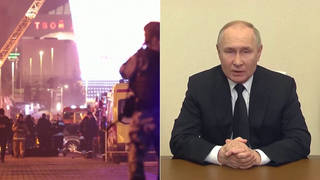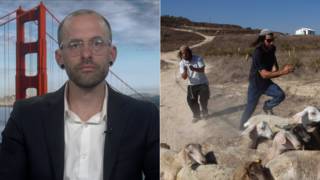Democracy Now! Tuesday, March 26, 2024
This content originally appeared on Democracy Now! Audio and was authored by Democracy Now!.
This post was originally published on Radio Free.
Democracy Now! Tuesday, March 26, 2024
This content originally appeared on Democracy Now! Audio and was authored by Democracy Now!.
This post was originally published on Radio Free.
This content originally appeared on Democracy Now! and was authored by Democracy Now!.
This post was originally published on Radio Free.
This content originally appeared on Democracy Now! for Broadcasters – HD MP4 and was authored by Democracy Now! for Broadcasters – HD MP4.
This post was originally published on Radio Free.
This content originally appeared on Democracy Now! and was authored by Democracy Now!.
This post was originally published on Radio Free.
This content originally appeared on Democracy Now! and was authored by Democracy Now!.
This post was originally published on Radio Free.
This content originally appeared on Democracy Now! and was authored by Democracy Now!.
This post was originally published on Radio Free.
This content originally appeared on Democracy Now! and was authored by Democracy Now!.
This post was originally published on Radio Free.

Sudan is on track to become the world’s worst hunger crisis, according to the United Nations. For over a year, fighting between the Sudanese military and the rival Rapid Support Forces has disrupted the country, displacing over 8 million people who experience extreme hunger in the areas with the most intense fighting. The increasing demand comes as the U.N.'s appeal for $2.7 billion for Sudan is less than 5% funded. Funding is also drying up in Chad, where some 1.2 million Sudanese have taken refuge. “This is the largest sort of mass mortality crisis that we are facing in the world and the largest that we have probably faced for many decades,” says Alex de Waal, the author of Mass Starvation: The History and Future of Famine, who laments the “shocking” cuts to the World Food Programme that is essential to the global emergency response system. “If it doesn't work, we are going to find ourselves facing the kinds of crises of mass mortality that we have simply not seen for half a century or longer.”
This content originally appeared on Democracy Now! and was authored by Democracy Now!.
This post was originally published on Radio Free.

In Gaza, millions of Palestinians are starving after five months of U.S.-backed attacks by Israel, while Israel continues to prevent the delivery of essential provisions. UNRWA chief Philippe Lazzarini wrote on social media, “This man-made starvation under our watch is a stain on our collective humanity.” The head of the World Health Organization says children in Gaza are already dying of malnutrition. “This is fundamentally a political crisis,” says Alex de Waal, the author of Mass Starvation: The History and Future of Famine, who explains that even with a ceasefire and humanitarian aid, “a crisis like this cannot be stopped overnight,” and that “This will be a calamity that will be felt for generations.”
This content originally appeared on Democracy Now! and was authored by Democracy Now!.
This post was originally published on Radio Free.

ISIS-K, an affiliate of the Islamic State, has claimed responsibility for an attack on a popular concert hall in Moscow that killed at least 137. Authorities say gunmen opened fire inside the Crocus City Hall building during a sold-out rock concert and then set part of the venue on fire. More than 100 people were injured in the attack, and many remain in critical condition. Authorities have detained 11 suspects, four of whom, all reportedly citizens of Tajikistan, are charged with terrorism and face life sentences. As more details emerge about the attack, we speak with professor of international affairs at The New School Nina Khrushcheva about the history of Muslim fundamentalist attacks in Russia and Putin’s “unfortunate” decision to ignore Western intelligence warnings about terrorist attacks. We’re also joined by longtime Moscow correspondent for The New Yorker Joshua Yaffa, who details possible motivations for ISIS-K and how Putin is attempting to fit this attack into his narrative opposing Ukraine and the West. “First and foremost, he cares about preserving his own power and the continued stability of his ruling system,” says Yaffa, who explains how Putin tries to control political blowback by equating ISIS-K with any group he opposes, including Alexei Navalny’s anti-corruption network and the so-called worldwide LGBT movement. “This is important to understand both in trying to determine how this attack happened in the first place and also what might Putin’s response be moving forward.”
This content originally appeared on Democracy Now! and was authored by Democracy Now!.
This post was originally published on Radio Free.
This content originally appeared on Democracy Now! Audio and was authored by Democracy Now!.
This post was originally published on Radio Free.
This content originally appeared on Democracy Now! and was authored by Democracy Now!.
This post was originally published on Radio Free.
This content originally appeared on Democracy Now! for Broadcasters – HD MP4 and was authored by Democracy Now! for Broadcasters – HD MP4.
This post was originally published on Radio Free.
This content originally appeared on Democracy Now! and was authored by Democracy Now!.
This post was originally published on Radio Free.
This content originally appeared on Democracy Now! and was authored by Democracy Now!.
This post was originally published on Radio Free.
This content originally appeared on Democracy Now! and was authored by Democracy Now!.
This post was originally published on Radio Free.

In Mississippi, six former sheriff’s deputies have been sentenced to between 10 and 40 years in prison for raiding a home and torturing, shooting and sexually abusing two Black men, Michael Jenkins and Eddie Parker, in January 2023. The six former deputies, all of whom are white, called themselves the “Goon Squad” and have been linked to at least four violent attacks on Black men since 2019. Two of the men attacked and tortured by the group subsequently died. To discuss the case and the verdict, we’re joined by Eddie Parker and attorneys Malik Shabazz and Trent Walker. “Never have we seen this many police officers sentenced to this kind of time in one week,” says Shabazz, who calls the verdict “historic.” Jenkins, Parker and Shabazz are currently suing the Rankin County Sheriff’s Department over its track record of civil rights violations and racist targeting of Black residents.
This content originally appeared on Democracy Now! and was authored by Democracy Now!.
This post was originally published on Radio Free.
This content originally appeared on Democracy Now! and was authored by Democracy Now!.
This post was originally published on Radio Free.

Building on an unprecedented wave of settler violence in 2023, Israeli attacks against Palestinians in the occupied West Bank have intensified since October 7, with over 400 Palestinians killed by Israeli forces and settlers over the past five months. Last week, the Biden administration imposed sanctions on three Israeli settlers and two Israeli outposts in the occupied West Bank for assaulting, harassing and threatening Palestinians, and violently expelling many from their land. Investigative journalist Shane Bauer traveled to the territory to map out the violence against Palestinians that has escalated since October 7, and visited the illegal outposts of “two very dangerous men” targeted by the sanctions: Neria Ben-Pazi and Moshe Sharvit. “The elephant in the room here is that [Moshe Sharvit], along with Neria Ben-Pazi, is supported by the state of Israel directly,” says Bauer. “According to the language of the sanctions, that would mean that the State of Israel itself and all the various organizations that are supporting him should themselves be sanctioned, but of course they haven’t been.” Bauer describes how “the line between settlers and the army virtually disappeared after October 7,” as far-right Israeli cabinet members push for “a formalization of apartheid,” in the West Bank.
This content originally appeared on Democracy Now! and was authored by Democracy Now!.
This post was originally published on Radio Free.

We speak with Senator Chris Van Hollen of Maryland about the U.S. response to Israel’s brutal offensive on Gaza, which has killed over 32,000 Palestinians. Van Hollen expresses “strong frustration with the Biden administration,” which “needs to do a lot more” to hold Israeli Prime Minister Benjamin Netanyahu accountable. Defying Biden’s warnings against a full-scale ground operation in Rafah, Netanyahu continues to promise an invasion of the city, where 1.4 million forcibly displaced people from across Gaza are sheltering. “At the end of the day, Prime Minister Netanyahu simply ignores the president of the United States, and so we need to do more to make Netanyahu accountable for our requests,” says Van Hollen, who warns Biden against “getting dragged into the planning of a Rafah invasion” and becoming “complicit in Netanyahu’s actions.” The senator also discusses U.S. funding of UNRWA and Israeli leaders blocking aid for Gaza. “For goodness’ sakes, lift the restrictions that are in place that are creating this humanitarian disaster in Gaza.”
This content originally appeared on Democracy Now! and was authored by Democracy Now!.
This post was originally published on Radio Free.
This content originally appeared on Democracy Now! Audio and was authored by Democracy Now!.
This post was originally published on Radio Free.
This content originally appeared on Democracy Now! and was authored by Democracy Now!.
This post was originally published on Radio Free.
This content originally appeared on Democracy Now! and was authored by Democracy Now!.
This post was originally published on Radio Free.
This content originally appeared on Democracy Now! and was authored by Democracy Now!.
This post was originally published on Radio Free.

Haiti is being gripped by escalating violence and turmoil as armed groups battle for control in the streets. Last week, unelected Haitian Prime Minister Ariel Henry announced he would resign, after a coalition of armed groups opposing the de facto leader declared an uprising. Negotiations to establish a transitional presidential council are being led by the U.S.-backed Caribbean political alliance CARICOM as a refugee crisis brews, with the Biden administration floating the idea of housing Haitian asylum seekers in Guantánamo Bay. We speak to Dan Foote, who resigned from his post as U.S. special envoy for Haiti in September 2021 over the Biden administration’s “inhumane” treatment of Haitian asylum seekers and U.S. interference in Haitian politics. “We’re holding Haiti hostage through this CARICOM political process,” says Foote, who says Haitian sovereignty must be respected in order to break the cycle of intervention, unrest and violence. “Everybody has an answer for Haiti. Unfortunately, historically, none of those answers have worked.”
This content originally appeared on Democracy Now! and was authored by Democracy Now!.
This post was originally published on Radio Free.